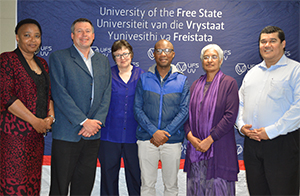Latest News Archive
Please select Category, Year, and then Month to display items
12 January 2024
|
Story Nonsindiswe Qwabe
|
Photo Sonia Small
 Since joining the UFS in 2008, Dr Grey Magaiza has worked extensively on approaches that can foster the socio-economic transformation of societies.
Since joining the UFS in 2008, Dr Grey Magaiza has worked extensively on approaches that can foster the socio-economic transformation of societies.
“The future should be one where communities can decide on their development agenda and futures. That’s the most important for me.” Dr Grey Magaiza, Deputy Director of the Centre for Gender and Africa Studies (CGAS) and Head of the Community Development programme on the Qwaqwa Campus, is passionate about capacitating communities to be agents of change and advancement. His vision for the future emphasises the empowerment of communities to take charge of their development by actively participating in decision making and the implementation of development projects that can improve their lives.
Since joining the UFS in 2008, Dr Magaiza has worked extensively on approaches that can foster the socio-economic transformation of societies. Over the years, he has crafted his research speciality into one that he is most proud of – being an interdisciplinary scientist immersed in the development of communities.
“I’m in a fortunate position of researching what I like. I say ‘fortunate’, because I’ve taken the time to understand what I’m passionate about, which is the overall field of rural livelihoods and livelihood futures – in short, community development. My research starts from an engaged university, understanding the elements that a university must use to enhance transformation and relevance to its immediate community in terms of development.”
One of the ways he has done this is by looking at social entrepreneurship as a development approach for young people in a rural setting. Through workshops with non-profit and civic organisations in Qwaqwa, Dr Magaiza has been helping these organisations to map out their needs and actively meet them through the involvement and support of external role players.
“We understand that communities are part of the national development agenda, but even that national agenda respects community knowledge and intentions and allows communities to shape their identity. A critical enabler of this is community organising. You bring back the capacity in communities to have dialogues on issues affecting them as spaces for engagement, knowledge exchange, and for people to just talk about their way forward.”
By enabling communities to define their development agenda, they can address their specific needs, challenges, and aspirations, he said. “When I look at livelihood futures, it’s quite an exciting aspect of my work – it’s like looking into a fortune tellers’ globe, because you’re not deciding for communities what they should do, but the communities themselves take those decisions.”
Qwaqwa Campus launches new degree in Community Development
2016-11-29

Photo (from the left): Morongoe Mohaleroe
(Department of Social Development), Albert Schoeman
(Assistant Dean: Faculty of the Humanities),
Dr Elsa Crause (Campus Vice-Principal:
Academic and Research), Grey Magaiza
(Programme Head: Community Development),
Dr Margie Maistry, and Prof Darren Lortan
(both from Durban University of Technology).
From 2017, the Qwaqwa Campus of the University of the Free State will offer a new professional degree in Community Development. This was revealed during the launch that was recently held on the campus.
Speakers acknowledged the positive contribution the new degree was expected to make in the region, especially in mobilising the civil society to join hands with the government in improving the quality of life in South Africa.
“There has always been a dire need for such a degree in this part of the country,” said Morongoe Mohaleroe, the Thabo Mofutsanyana District Director in the Department of Social Development.
“Our department is working hard at both national and provincial levels to professionalise this sector, and the qualification will definitely help in that regard,” she said.
Mohaleroe also thanked the campus for supporting her department with community-based research and studies by students.
Speaking during the launch, the Campus Vice-Principal: Academic and Research, Dr Elsa Crause, said the campus was proud to be the first in the country to offer this professional qualification.
‘‘What has brought us all here today, is history in the making,’’ she said to an audience consisting of a broad spectrum of stakeholders, including government and civil society structures like Save the Children and World Vision.
“Our campus will be the first in South Africa to offer this type of degree and a maximum of only 35 students will be accepted,” she added.
For more details, prospective students may contact Grey Magaiza (Programme Head: Community Development) at magaizag@ufs.ac.za or +27 58 718 5419.